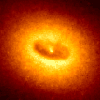Diagnostic Procedures 
Clinical / Physical Examination
The physical assessment of a patient utilizes inspection, palpation, percussion, auscultation, olfaction and adjunctive techniques. Following documentation of the physical examination, radiographic examination, laboratory examination, and adjunctive procedures an assessment (diagnosis) is formulated for the patient. A treatment plan is then developed relative to the diagnosis. The traditional physical examination is outlined as follows:
General Appearance - (height, weight, demeanor, posture, gait, and odor) VS - vital signs (blood pressure, temperature, respiratory rate, pulse) Head Eyes Ears Nose Throat Dental Mouth Face Neck Chest heart lungs Abdomen Back Genitalia/Rectal Extremities Skin Neuro
Weed's problem-oriented medical record is an alternative approach that list established diagnoses as well as unexplained findings as either active or inactive in a problem list. The problems are numbered and given a title. Subsequent patient information is entered into the record relative to the number to which it belongs. A progress note for a given problem is outlined as follows:
Subjective: (data) Objective: (data) Assessment: Plan: